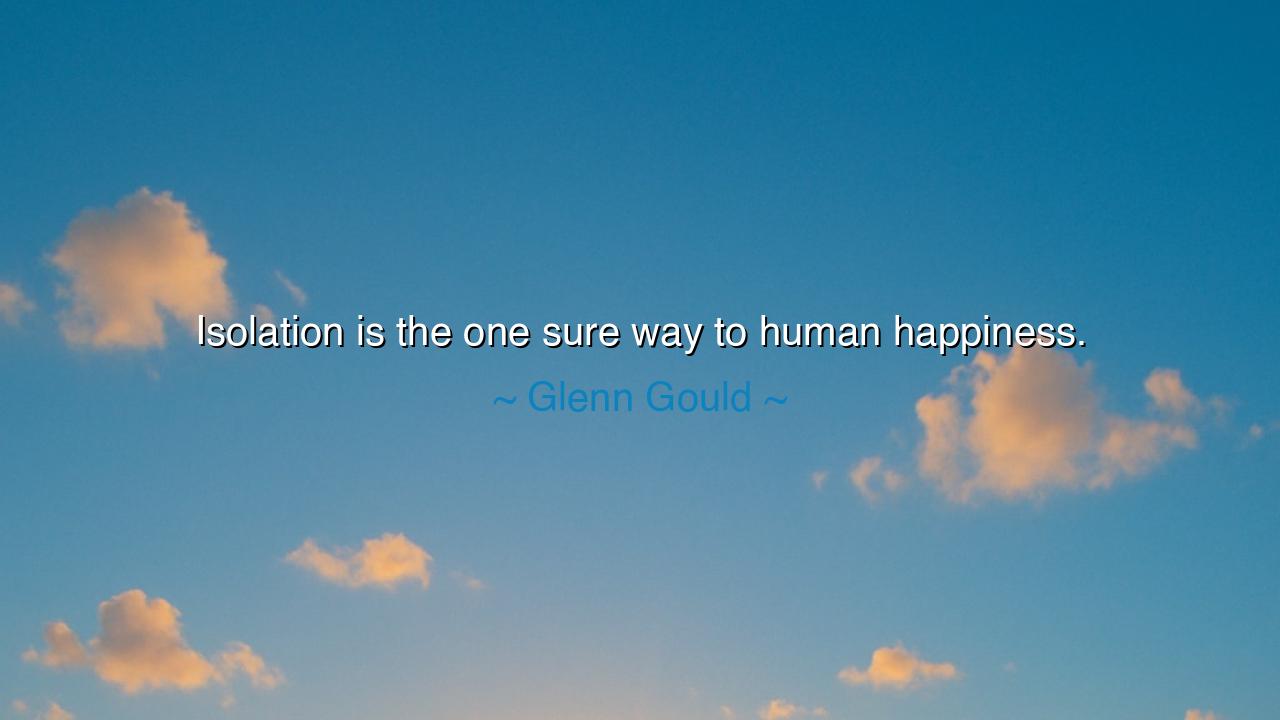
Isolation is the one sure way to human happiness.






"Isolation is the one sure way to human happiness." — Glenn Gould
Thus spoke Glenn Gould, the brilliant and enigmatic pianist who withdrew from the concert halls of the world at the height of his fame, retreating into solitude as one retreats into a sacred temple. His words, at first glance, seem strange — even harsh — to those who live by the warmth of company and the noise of cities. Yet in this declaration lies a deep and ancient truth: that happiness, the kind that endures beyond applause and possession, can only be found in isolation, in the stillness where the soul meets itself. Gould, who turned away from the world not out of disdain but out of longing for purity, teaches that it is only in separation from the endless clamor of others that the spirit can hear its own true voice.
To understand his meaning, one must first know the man. Glenn Gould was not merely a pianist; he was a seeker — a philosopher who used music as his medium of revelation. His performances were legendary, his interpretations transcendent, yet he abandoned the stage at the age of thirty-one. The world called him eccentric, even mad, for refusing fame. But Gould understood something profound: the noise of praise can drown the music of the soul. He sought not the fleeting joy of recognition, but the lasting peace of creation in solitude. In his lonely studio, surrounded only by instruments and silence, he found what he called happiness — not the happiness of pleasure, but the happiness of truth.
The ancients would have understood this well. Lao Tzu, the sage of the Tao, taught that “he who conquers others is strong, but he who conquers himself is mighty.” The conquest of self is possible only in solitude. Buddha, too, found enlightenment not in the marketplace but beneath the Bodhi tree, alone. Thoreau, centuries later, withdrew to Walden Pond to learn “what it meant to live deliberately.” Gould’s insight stands among these — that isolation is not a withdrawal from life, but a pilgrimage into its essence. For in silence, one learns the difference between noise and truth; in solitude, one remembers that the world within is vaster than the world without.
Yet, this teaching is not without paradox. Isolation can be a teacher, but it can also be a tormentor to the unprepared. Many fear the quiet because in it they hear the echo of their own confusion. To be alone is not merely to be without others; it is to stand naked before one’s own thoughts. Gould’s isolation was not escapism — it was discipline. He turned solitude into an instrument of understanding. He taught that happiness does not arise from absence, but from presence — the full awareness of one’s own inner life. When he said that isolation was the sure way to happiness, he did not mean withdrawal from love or humanity, but withdrawal from illusion.
We see this echoed in the life of Leonardo da Vinci, who often secluded himself for weeks, sketching and thinking in silence. It was in those moments apart from court and crowd that he birthed visions beyond his age — flying machines, anatomies of the human body, the mysteries of light and shadow. His solitude was not loneliness, but creation’s womb. So too with Gould, whose best works came not from performance before others, but from communion with his own mind and the divine architecture of music. The truly creative, the truly wise, often find their joy not in the clamor of many voices, but in the harmony of their own stillness.
But this does not mean that all must abandon the world to find peace. The lesson is subtler, more inward. It is not necessary to flee to mountains or hermitages, but to learn to be alone within oneself — to cultivate stillness even in the midst of the crowd. The true meaning of Gould’s isolation lies in self-sufficiency, in knowing that happiness cannot be borrowed from others. It is born of introspection, of clarity, of learning to love the quiet company of one’s own being. When we no longer depend upon the noise of approval or the distraction of company, we begin to taste the sweetness of real freedom.
So, my listener, take this teaching to heart: seek the silence that reveals, not the silence that hides. Each day, withdraw a little from the world’s tumult — from its endless talk, its restless craving — and listen to the still voice within you. Walk alone among the trees, sit in quiet thought, let music or nature speak where words fail. In that stillness, you will find that the heart expands, that creation begins, and that the burdens of the world fall away like dust. For the one who has learned the art of peaceful isolation is never truly alone; they walk with truth, with clarity, with joy unshaken by circumstance.
And thus, as Glenn Gould reminds us, isolation is the one sure way to human happiness — not because it denies the world, but because it teaches us to find the world within. The outer silence awakens the inner symphony. The retreat from noise becomes a return to harmony. And when the mind, at last, grows still enough to hear the quiet music of existence, one discovers that happiness was never something to be pursued — it was always there, waiting, in the sacred solitude of the soul.






AAdministratorAdministrator
Welcome, honored guests. Please leave a comment, we will respond soon